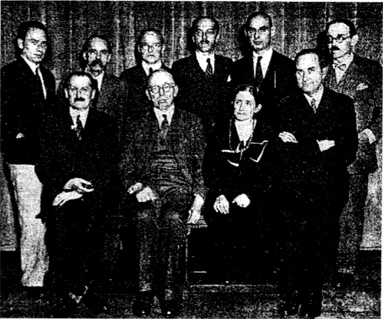| School | Troops | Resources |
The Emigrés

The rise of Fascist and Nazi governments in Central Europe during the 1920s and 1930s was usually accompanied by the purges of universities, and the dismissal of faculty, researchers and students. The reasons for dismissal varied - some, notably in Nazi Germany, were removed on racial grounds (e.g. of Jewish extraction), many others for their political leanings (Socialists, Liberals), others for refusing to swear personal oaths of allegiance to the new regime and its self-styled leader, and some for simply not being enthusiastic and supportive enough of fascist doctrines and policies. Many did not wait for dismissal, but left their positions voluntarily - out of fear, or out of disgust, or because they found the new atmosphere hostile and uncongenial or simply felt that their academic freedom was severely compromised. Regardless of the reasons, the 1930s saw the wholesale implosion of the university systems of Germany, Austria, Italy and elsewhere. The expansion of Nazi power during the war expanded the purges to occupied Belgium, France, etc.
The legions of unemployed academics looked abroad to find new positions - in Britain, the United States, Turkey, whomever would take them. This was not easy. Although other nations were politically more democratic, this was the height of racist and xenophobic times across the board, and tight immigration restrictions had been set up since the 1920s. This prevented the emigré scholars from simply taking a boat, but had to secure positions first, which meant finding a sympathetic sponsor abroad. Given the general paucity of available academic positions, combined with the fact that many universities informally maintained quotas to limit the number of Jews and foreigners on campus, this was not easy. And even if they got a position, they had to get their immigrant visas approved by suspicious and often uncooperative government authorities. Given the severe limits imposed by immigration laws and the immense wave of refugees, available quotas were quickly filled during this time, and they frequently had to plead their individual case for exception, which made it doubly harder.
The herculean task of assisting the emigré scholars find their way abroad was undertaken by many sung and unsung heroes. From prominent university leaders, like Alvin S. Johnson, who tirelessly worked to overcome internal prejudices to bring the emigré scholars over, to major institutions, like the Rockefeller foundation, who helped fund them, to small local volunteer groups, like the British "Blue Knights", who helped with the more mundane matters like housing, paperwork, etc., upon their arrival. Every emigré scholar has a story of an angel, or group of angels, who made their escape possible. Not all succeeded - some, in despair, turned to suicide for escape, others perished in concentration camps.
Central Europe has never quite recovered from the wholesale destruction of its universities during the fascist-nazi era - or rather, have never quite recovered the prominent perch from which they fell. Before this period, German universities had enjoyed a reputation as the foremost research universities in the world, the leading centers of scientific research and scholarship, attracting foreign students and scholars, and jealously modeled by others. By contrast, American and British universities, hitherto relative backwaters, seemingly more interested in the education of gentlemen than research, were transformed, as the emigré scholars supplied its faculties with a vital injection of seriousness and research-orientation.
The major immediate beneficiaries - at least initially - of the emigré scholars were not the old, prejudiced universities, but new institutions which had been recently (or purposefully) created . Alvin S. Johnson, president of the New School for Social Research, took a lead role in finding places for European social scientists in American universities, when these ran out, he decided to set up an entire university division - the "University in Exile" - to host them. Similarly, the Oxford Institute of Statistics and the Cowles Commission raked the wave of European emigrés, and cemented their ascent. Without the emigrés, it is doubtful whether they would have existed, or achieved what they did. While less existentially vital to old, well-established universities, some - notably Cambridge, Harvard, Princeton and (to some extent) Chicago - reaped an enormous gain from the scholars and enjoyed a golden age because of them.
It is worth noting that some emigrés arrived in their foreign homes before the Fascists or Nazis took power - the vital dates of 1933 for Germany, 1938 for Austria or 1940 for France, are not necessary hard dates across the board. Some had gone abroad already, often on Rockefeller fellowships and the like, some with premonitions from the political violence, others quite innocently, and simply decided not to return.
The following is only a partial list of emigré scholars by origin (rather the destination).
Germany
Austria
Hungary
Poland
Belgium
Soviet Union
Italy
|
HET
|
|
Resources of Emigrés
|
All rights reserved, Gonçalo L. Fonseca
